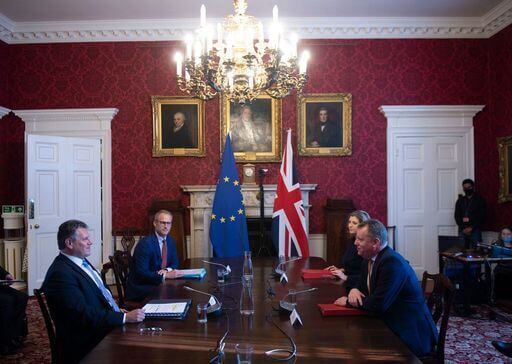Ireland’s European Affairs minister has today warned that the situation in Northern Ireland “is clearly very fragile”, as the UK-EU talks over the deal governing the region post-Brexit, as talks rumble on with little sign of breakthrough.
His comments come ahead of another scheduled meeting between Lord Frost and the EU Commission’s vice president Maroš Šefčovič in London today.
The Brexit minister told the Lords on Wednesday that ongoing UK-EU talks regarding the Northern Ireland Protocol have failed to make progress, but implied that the UK would not resort to triggering Article 16 unless further weeks of talks fail.
There have been recent reports that Article 16 could be triggered as early as the conclusion of the COP26 UN climate summit due to end in Glasgow on Friday, so it would seem that Lord Frost is keen to deny this.


In an interview with Radio 4’s Today programme this morning, Thomas Byrne referred to reports of “instances of violence, instances of fragility of that peace process this week”, saying that:”Further instability will only lead to a continuation of that.
“If we can get certainty, if we can get a continuity in trading arrangements, and less of this discussion, what will happen is that the economy in Northern Ireland will prosper and that then helps as well the social situation, which is very, very delicate at the moment.”
He continued, arguing that the EU ” don’t want to make threats but want to bring this conclusion”, saying that there was a “prize of stability and peace in Northern Ireland, and the continuing good diplomatic and trading relationship between Britain and the European Union,” if a deal was reached.
The Protocol was implemented to prevent a hard border between Northern Ireland and the Republic of Ireland in the wake of Brexit by keeping Northern Ireland in the EU’s single market for goods. It has been heavily criticised by unionist groups for allegedly undermining the union between Northern Ireland and the rest of the UK, which remains outside the EU customs union.
The UK’s proposals include changing the legal basis of the Protocol to that of a Treaty governed by international law, not EU law policed by the European Court of Justice. The current Protocol, Lord Frost has said, meant the EU could “make laws which apply in Northern Ireland without any kind of democratic scrutiny or discussion.” The EU is not keen to permit this.

